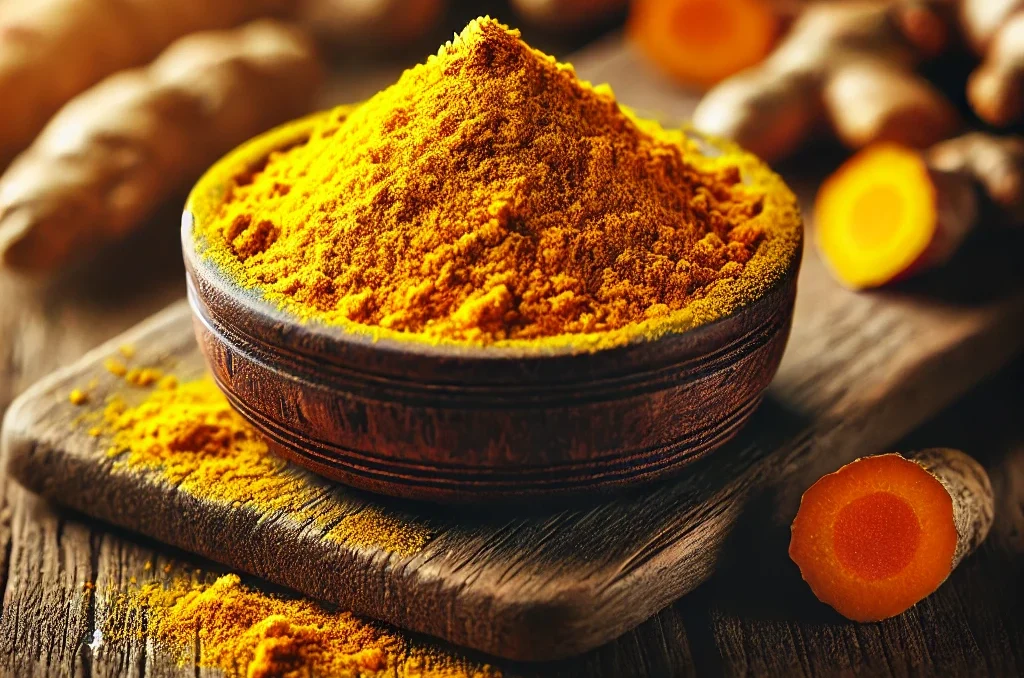Turmeric, often called the “golden spice,” is a vibrant yellow-orange root that has been a cornerstone of traditional medicine and culinary practices for centuries. Native to South Asia, turmeric is widely recognized for its active compound, curcumin, which boasts powerful anti-inflammatory, antioxidant, and healing properties. From boosting immunity to supporting joint health, turmeric offers a multitude of health benefits.
Health Benefits of Turmeric
Potent Anti-Inflammatory Properties: Curcumin in turmeric is one of the most effective natural anti-inflammatory agents. It can help reduce inflammation, which is beneficial for conditions like arthritis, inflammatory bowel disease, and other chronic illnesses.
Rich in Antioxidants: Turmeric is loaded with antioxidants that combat oxidative stress, reduce damage from free radicals, and protect cells from aging and disease.
Supports Joint Health: Turmeric is commonly used to alleviate joint pain and stiffness associated with arthritis. Its anti-inflammatory effects may help improve mobility and reduce discomfort.
Boosts Brain Function: Curcumin has been linked to increased levels of brain-derived neurotrophic factor (BDNF), a protein that supports brain function and memory. It may help reduce the risk of neurodegenerative diseases like Alzheimer’s.
Promotes Heart Health: Turmeric supports heart health by improving endothelial function, which regulates blood pressure and circulation. Its anti-inflammatory and antioxidant effects also reduce the risk of heart disease.
Aids in Digestion: Turmeric supports digestive health by stimulating bile production, which aids in the digestion of fats. It can also help alleviate symptoms of indigestion and bloating.
Supports Liver Detoxification: Turmeric promotes liver health by enhancing the body’s natural detoxification processes, protecting the liver from damage caused by toxins.
Boosts Immunity: Turmeric has natural antimicrobial and immune-boosting properties, helping the body fight infections and maintain overall health.
May Help Manage Blood Sugar Levels: Some studies suggest that turmeric can improve insulin sensitivity and help regulate blood sugar levels, making it potentially beneficial for people with diabetes.
May Have Cancer-Fighting Properties: Curcumin has been studied for its potential to inhibit the growth of cancer cells, reduce the spread of tumors, and even enhance the effects of certain cancer treatments.
Uses of Turmeric
Flavoring Agent: Turmeric is commonly used in curries, soups, rice dishes, and marinades. It adds a warm, earthy flavor and a vibrant yellow color to food.
Golden Milk: Turmeric is often used to make “golden milk,” a traditional drink made with milk (or plant-based milk), turmeric, and spices.
Digestive Health: Turmeric is sometimes used to support digestive health and may help with issues like bloating and gas.
Traditional Medicine: In traditional medicine systems, such as Ayurveda and Traditional Chinese Medicine, turmeric has been used for various ailments, including skin conditions, respiratory issues, and digestive problems.
Aromatherapy: Turmeric essential oil is used in aromatherapy for its potential calming and grounding effects.
Safety Considerations
Allergic Reactions: Some individuals may be allergic to turmeric. Symptoms can include itching, swelling, or difficulty breathing. If you experience these symptoms, seek medical attention.
Pregnancy and Breastfeeding: While culinary amounts of turmeric are generally considered safe, high doses or concentrated forms (like supplements) should be avoided during pregnancy and breastfeeding due to potential hormonal effects.
Drug Interactions: Turmeric may interact with certain medications, including blood thinners, antidiabetic medications, and drugs that affect stomach acid. Consult a healthcare provider if you are on medication and considering turmeric supplements.
Dosage: If using turmeric supplements, follow the recommended dosages on the product label or consult a healthcare professional for guidance. High doses of turmeric may cause gastrointestinal issues in some individuals.
Absorption: Curcumin has low bioavailability, meaning it is not easily absorbed by the body. Consuming turmeric with black pepper (which contains piperine) can enhance absorption.
Conclusion
Turmeric is much more than a spice, it’s a natural remedy with extraordinary health benefits. Its potent anti-inflammatory and antioxidant effects make it a valuable ally in managing chronic conditions, enhancing skin health, and supporting overall vitality. Embrace the power of this golden spice to enrich both your meals and your health.
